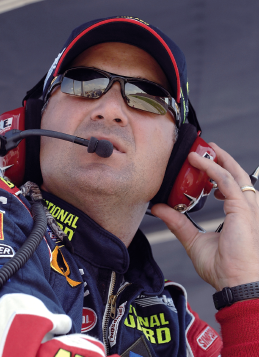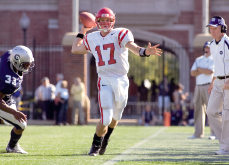Chad Walter ’93 Keeps The Race Cars Running
CHAD WALTER '93 KEEPS THE RACE CARS RUNNING

With his engineering degree in hand, chad Walter '93 left Cornell and headed south to look for a job in stock car racing. His decision was not well received, either in North Carolina or back home. "My mom wasn't happy about it," says Walter, who grew up near Buffalo. "She thought I was crazy for wanting to work on race cars after getting an Ivy League education." And as for the racing teams? "They were a bunch of good ol' boys, and they knew what they were doing," Walter says. "They knew how to make these cars go fast, and they didn't need an engineer's opinion. I couldn't have given them a good one anyway, because I didn't know a whole lot about it."
But times have changed—and engineers have become a vital part of the NASCAR scene. Walter is now crew chief for the No. 24 National Guard Chevrolet in the NASCAR Busch Series, working for one of the top teams in auto racing, Hendrick Motor-sports. The team, which has seventeen cars and $22 million in sponsorship, is a long way from Walter's first job. "I pushed brooms, busted down tires, moved equipment around—whatever needed to be done," says Walter, who played Big Red football for a couple of seasons until injuries forced him out. "I was around race cars for five or six years before I started to tell people that I knew how to turn on a computer. That was the smartest way I could have done it, because I learned about what I was engineering before actually doing it."
Walter had been a race fan growing up; his appreciation for the sport deepened when he worked on Cornell's Formula SAE team, competing against other schools to design an open-wheel race car to specifications from the Society of Automotive Engineers. (The cars are judged on both design and performance; with Walter on the team, Cornell took first place in 1992 and 1993.) He got his first engineering job with Dale Earnhardt Inc. in 2000, working on a Daytona 500-winning team, and eventually became head engineer. In 2005, he moved to Hendrick Motorsports as an engineer for the No. 5 and No. 25 Nextel Cup teams; a year later he served as crew chief for the No. 5 Busch Series car driven by Kyle Busch, which won one race and finished seventh in the season standings.
As crew chief, Walter's role is similar to that of the head coach of a football team. He's in charge of preparing the car in the garage, working with the driver to determine the best setup, and making strategic calls during the race. Walter relies on a crew of twenty-eight as he prepares for two to three races at a time; he's typically on the road at least three days a week during the season, which runs from February through mid-November. "This business is twenty-four hours a day, seven days a week, 365 days a year," says Walter, who is married and has four children. "There's no such thing as time off. The competition is so tight that you can't afford to take time off, or you're just going to suffer."
He's about to get even busier. Hendrick is combining its Busch Series program with JR Motorsports, which is owned by Dale Earnhardt Jr., who will move into a Hendrick Nextel Cup car in 2008. The driver lineup for the Hendrick-owned No. 5 car is slated to include Earnhardt, Mark Martin, and former Nextel Cup champion Jimmie Johnson, among others. The team will operate out of the JR Motorsports garage in Mooresville, North Carolina, with Hendrick Motorsports supplying engines, chassis, and engineering. As the crew chief of the No. 5, Walter will spend much of the off-season moving people and equipment thirty miles from Charlotte to Mooresville. "We'll have two teams running for the championship, and I'm excited about that," says Walter. "I love coming to work every day." And though much of his time is spent poring over test results and notes from previous races, Walter says the non-technical aspects of his job are more important. "Making the cars handle well at 180 miles per hour isn't easy, but it's secondary to me now," he says. "The things that are a struggle are in people management. Keeping everyone happy and working together is tough. The question I face each day is: how do I get 110 percent out of these guys? Because that's what it takes to be successful."
Sports Shorts
GIANT STEP After a rookie season in which he started 14 of 16 games, Kevin Boothe '05 had little reason to think that he wouldn't be back with the Oakland Raiders in 2007. Then a new head coach took over, and he found himself one of the players let go when the team made its final cuts. But Boothe, a 6-foot-5, 315-pound guard, didn't stay unemployed for long. The day after he was released by the Raiders, the New York Giants picked him up on waivers to bolster their offensive line. Ten-year NFL veteran Seth Payne '97 wasn't as fortunate, as he was cut by the Jacksonville Jaguars. Originally drafted by the Jaguars in 1997, Payne moved to the Houston Texans five years later. His 2006 season was truncated by a knee injury, and the Texans eventually released him. He tried to catch on again with the Jaguars, but was cut before the regular season began.

FLEET FEET Kim Standridge '11 didn't take long to make her mark on the cross-country record book. The freshman from Randolph, New Jersey, won her first race with the Big Red, posting the school's best time ever by a woman runner on the 5K Moakley Course layout. Despite falling once while running in the rain, Standridge covered the course in 18:36.6, eclipsing the previous Cornell record of 18:36.9 set by Emily Germano '00 and just missing the overall course record of 18:34 set by Ashley Ulrich of Army in 2003. Cornell took six of the top seven places to open the season with an 18-43 win over Army.
HOME FIELD Cornell is guaranteed to play a role in the 2008 NCAA men's lacrosse playoffs, even if the team isn't in the tournament. The NCAA has announced that Schoellkopf Field will be one of two sites for quarterfinal contests. Two games will be held in Ithaca on Sunday, May 17, with the winner of each advancing to the NCAA semifinals in Foxboro, Massachusetts, a week later. Navy will host the other two quarterfinal games on Saturday, May 16.

BACK ON BOARD The Cornell rowing program recently welcomed back one of its own as a member of the coaching staff: Dan Fronhofer '04 has been named assistant coach for women's rowing after working as a volunteer assistant with the men's lightweight and heavyweight teams last season. Fronhofer was a four-year member of the crew team and as a senior earned the Ackerman Award for motivation and inspiration. His post-Cornell rowing career has included a gold medal at the 2006 Head of the Charles Regatta in an eight-man shell and a trip to the Pan-American Game trials.
Big Game
September 29, 2007
One week after suffering a 51-12 loss at Yale, the Big Red football team bounced back in a big way, downing Georgetown 45-7. Playing before a GU Homecoming crowd of 3,184, Cornell dominated all aspects of the game. Senior Luke Siwula ran for 93 yards and three touchdowns, junior quarterback Nathan Ford completed 22 of 32 pass attempts for 201 yards, and the defense shut down the Hoyas, allowing only 119 yards rushing and making five sacks. "We played very strongly against Bucknell and then last week [against Yale] we didn't perform the techniques like we should have," head coach Jim Knowles '87 told the Daily Sun. "We challenged them this week—and I love the way our front line responded."


